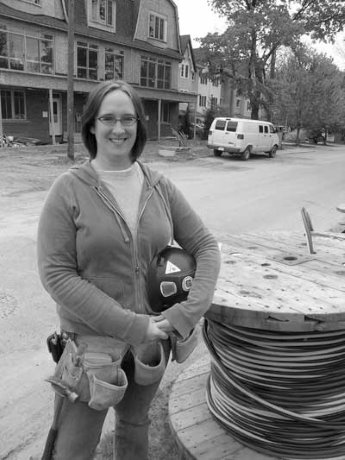Halfway through her work day, Laurie Ward hangs up her carpenter’s apron and slips off her steel-toed boots, then changes into her office garb.
Training
Journeyman Laurie Ward shares her enthusiasm for her chosen career at parent-teacher nights
Halfway through her work day, Laurie Ward hangs up her carpenter’s apron and slips off her steel-toed boots to change into a skirt and high-heeled shoes.
During daylight hours, the young woman is a journeyman carpenter working with the Toronto District School Board to keep its 560 schools in good shape to safely accommodate more than 284,000 students.
In the evening, she moves to the front of the classroom to teach a vital lesson – not to the students, but to their parents.
Ward, 33, meets with parents coming into the schools on parent-teacher nights to persuade them to consider a curriculum for their children that will introduce them to the skilled trades.
“One of the biggest problems we have in supplying the construction industry with qualified, trained trades is overcoming the prejudice many ill-informed parents have about their children choosing a career in the construction trades,” said Eddy Thornton, director of apprenticeships with Toronto’s Local 27 of the United Brotherhood of Carpenters and Joiners of America.
“In Europe the average age of a first-year carpenter apprentice is 18. In Canada it’s 28,” said Thornton, “and that’s usually because kids are dissuaded by their parents from joining the trades, until they become an adult and realize that’s what they really want to do.”
Ward is trying to eliminate that prejudice earlier in the game. She meets with parents of grade school students to tell them of the opportunities for their children to have prosperous, fulfilling and happy work lives by pursuing a career in the construction trades.
She knows of what she speaks. Ward herself earned an honours degree in philosophy from York University and was in a management position in business when she decided to explore that little idea that had been nagging away at the back of her mind.
She always wanted to work with her hands and always thought carpentry would be both satisfying and lucrative. At age 27 she became a carpenter apprentice with Local 27 of the carpenters’ union.
And when she graduated four years later, Ward was the first woman in Canada to earn the Red Seal in carpentry. The Red Seal is a national recognition of qualifications to work anywhere in Canada.
Apprenticeship programs are under provincial and territorial jurisdiction and often have different standards across Canada.
Those who hold a Red Seal in their trade are recognized as fully qualified in all areas of Canada.
When Ward speaks to parents she usually shares her message with Art Mayer, a retired high school guidance teacher.
Mayer has been campaigning for years to have school principals and school boards put more emphasis and money into the technical wings of their schools.
He points out only about 25 per cent of high school students carry on to post-secondary education. Our education can better serve the majority of its students, says Mayer.
Both Ward and Mayer know that pressure from parents is a powerful weapon in getting school boards to make changes.
“I tell the parents how much more fulfilled and happy I am working as a carpenter, compared to my career as a business manager. Being happy and fulfilled is what most parents want for their children,” said Ward.
“And if it is money that is their highest priority, I tell them about the unlimited opportunities there are for young people who earn a certificate as a trade and maybe start their own business.
“Many of the very wealthy people we hear about in Toronto earned their money as entrepreneurs within their chosen trade,” said Ward.
Standing before the parents as a successful, confident woman also conveys the message that being female is no drawback in the building trades.
She has delivered much the same message to young students as well. Ward has toured schools to promote OYAP, (Ontario Youth Apprenticeship Program).
“I first tell the students what great opportunities are opened up to them if they take some optional technical courses.
“They can still take an academic route and go to university, but the technical courses also give them a broader-based education and introduce them to lots of alternatives.
“Students today have to complete 40 hours of volunteer work in their community to graduate and I point out how they can get a taste of a career in the building trades by volunteering to build sets for amateur theatres and such.”











Recent Comments
comments for this post are closed